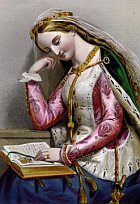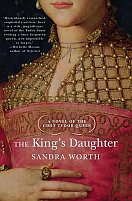HISTORICAL
FICTION
|
|

|
|

Elizabeth
of York:
Sandra Worth portrays her as an avid reader of Boethius, the
Tristan romance and the Arthurian works of Sir Thomas Malory
|

Elizabeth
Woodville,
Elizabeth's
mother and wife to King Edward IV
|

Richard
III
Elizabeth often compares
Richard III to
the image of King Arthur in Sir Thomas Malory
|
Lady
Margaret Beaufort, mother of Henry VII and Elizabeth of York's
mother-in-law
|
|
|
BOOK
ILLUMINATIONS
From Medieval Book Reviews
HOME
ROMANCE
FICTION SUSPENSE & THRILLERS
MYSTERY
AUTHORS REVIEWER
PROFILES
|
The King's Daughter:
a Novel of the First Tudor Queen

by Sandra Worth

Capitivity and Power
Plays, Kingship and Motherhood
Elizabeth of York, loyal daughter to
King Edward IV, worships her father and believes in him as king. While
her mother plots and schemes, her father reaches her with his ideas and
warmth. When he dies, Elizabeth encounters Richard, Duke of Gloucester,
the man appointed as regent for Edward's son. Despite the wicked rumors
about Richard and the multiple misfortunes her family experiences
throughout his rise to power, Elizabeth knows her father entrusted the
kingdom into his hands. Was he wrong? One night, Richard's wife Anne
speaks to her from the heart and Elizabeth comes to know better the
man, as king as and father, and indeed herself. As political pressures
come to bear, making her a pawn in a power play for the kingship, his
presence in her heart helps her to endure the horrors ahead and devote
her life to serving England as wife to Henry Tudor (Henry VII).
In the absence of letters or personal documents from Elizabeth of York
herself, Sandra Worth's first person narrative creates an insightful
portrait of her as a woman and mother during turbulent times as the
Middle Ages come to a close and a new era is born when Elizabeth
becomes the first Tudor queen. Sandra Worth makes the connections
between all the royal figures throughout these shifts of power so that
readers feel the intrigue and danger among the uneasy alliances. THE KING'S DAUGHTER gives a
chilling insight into the heart of the monarchy where family alliances
provide solace but also create a threat to one's very existence as
grabs for position within the family destroy. A brother is not just a
brother but also a man who stands in the way of access to power. Within
this context, the contrast between Elizabeth and her mother, and later
Elizabeth of York and Lady Margaret Beaufort (mother to Henry VII)
highlight the precarious position of women in this world as well.
Sandra Worth provides an intriguing look not only into the limited role
of women during this era but also a look into which the wield power of
their own and the determination choices royal women make, albeit in
ways perhaps less obvious to the casual observer.
THE KING'S DAUGHTER
brings several key characters to life so that historical figures
sometimes presented as isolated characters in history books are now
seen in their relationships to one another, thus giving this period a
new vibrancy and depth. THE KING'S
DAUGHTER focuses on Elizabeth as a woman in her roles as
daughter, lover, wife and mother. Sandra Worth views this period
through family dynamics and love first and foremost, juxtaposing the
sometimes brutal machinations of power of those surrounding Elizabeth
to her longings and devotion to family. Living her life in one sort of
captivity or another most of her life, some more obvious, such as her
time of escape to to sanctuary, than others, such as her being under
the almost absolute control of her mother-in-law, Elizabeth of York was
a quiet woman with a rich inner life. Elizabeth thought, read and
internalized omens and the great works of medieval literature from
Boethius, the Tristan tale to Sir Thomas Malory's Arthurian tales.
Although the dating of Boethius is off a couple of centuries (an
editing typo hopefully but an important correction not to miss), Sandra
Worth does an exceptional job not only in her selection of relevant
medieval works, but also in her use of them in Elizabeth's thoughts to
give a depth to her character and to the period itself. As the new
world emerges, slight hints of that change enter in references to
Erasmus and a chilling reference to Machiavelli's THE PRINCE. Through literature, the
reader comes to know Elizabeth's values and her intimate thoughts on
love and kingship. Though sometimes Elizabeth appears frustratingly
submissive, Sandra Worth's contrast to the careful and covetous
plotting of others shows growing determination within her to make a
difference, a determination that in the end makes her true to the name
"Elizabeth the Good" often bestowed upon her. As the novel progresses,
Elizabeth of York moves from being a woman mostly ruled by others to a
woman looking outward, not only as a mother trying to look out for her
children, but also a woman determined to serve her people. Sandra Worth
leaves readers with a haunting, disturbing image of the future Henry
VIII. THE KING'S DAUGHTER
will appeal to a wide variety of historical fiction readers, not only
for the presentation of a world in the process of change but also
Sandra Worth's ability to capture the the inner lives of her characters.
Publisher: Berkley
(December 2008)
Reviewed by Merrimon,
Merrimon Book Reviews

|
|
|